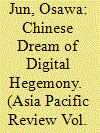| Srl | Item |
| 1 |
ID:
189275


|
|
|
|
|
| Summary/Abstract |
The Chinese government has been accelerating various moves to seize control of discourse power. This article focuses on China’s efforts to seize control of discourse power especially in cyberspace. The Xi Jinping administration is gradually becoming more aggressive in its control of narratives, moving from stable governance at home to strengthening its influence on external speech. The propaganda efforts to spread the legitimacy of the CCP regime and the coercive wolf warrior diplomacy are currently not very effective. However, China’s efforts in this area of discourse power are taking a new turn with the development of information technology. China is strengthening its efforts to take the lead in shaping international norms and international standardization. In addition, The PLA is also deepening its discussion of military operations including the cognitive domain as it prepares for Intelligentized warfare.
|
|
|
|
|
|
|
|
|
|
|
|
|
|
|
|
| 2 |
ID:
189276


|
|
|
|
|
| Summary/Abstract |
China holds a long-term national strategy called the “Chinese Dream” to overtake the United States to become the world’s leading hegemonic power by 2049. As a policy to realize the “Chinese Dream,” China has launched the “Digital Silk Road Initiative” and is developing an IoT platform on an information and telecommunications infrastructure in an attempt to capture the power to control information from the United States by enclosing information not only in the Eurasian continent but also in the world.
|
|
|
|
|
|
|
|
|
|
|
|
|
|
|
|
| 3 |
ID:
189277


|
|
|
|
|
| Summary/Abstract |
This article analyzes the quality of selected aspects and issues regarding relations between the German Democratic Republic (GDR) and China in the 1950s and early 1960s. How was Chinese dictator Mao Zedong’s Hundred Flowers Campaign perceived and interpreted in East Berlin, and why and until when was GDR leader Walter Ulbricht enthusiastic about Mao’s disastrous Great Leap Forward are among the questions this article will seek to answer. As it turned out, East German leaders’ assessments and newspaper reporting on Mao’s domestic and foreign policy and government propaganda did not in any way correspond with China’s on the ground realities. The East German authorities took Chinese propaganda and entirely false statistics and data on steel and agricultural production at face value and ordered its mouthpiece newspapers to do the same. The same was true for Chinese reporting and propaganda on Ulbricht’s decision to divide Berlin with a wall in 1961: misleading and nonsensical reporting in support of a fair-weather friendship, which in the wake of the Sino-Soviet Split in the early 1960s would turn into enmity (as ordered by Moscow).
|
|
|
|
|
|
|
|
|
|
|
|
|
|
|
|
| 4 |
ID:
189273


|
|
|
|
|
| Summary/Abstract |
The chairmanship at Nakasone Peace Institute (NPI) had been vacant since the passing in 2019 of founder and former Chairman Nakasone Yasuhiro. On October 22, 2021, Aso Taro was elected to the post of Chairman of Nakasone Peace Institute. Today, when Japan and the world are facing various challenges in such areas as security, politics and economics, and environmental issues, strong leadership is required above all. Since his first election as a member of the House of Representatives in 1979, Chairman Aso has served as Minister for Foreign Affairs and Prime Minister, after having served as Minister of State, Economic and Fiscal Policy, and Minister for Internal Affairs and Communications. Previous to these posts he led as minister and chairman of multiple other ministries and agencies in the areas of finance, fiscal policy, commerce and industry, and education, among others. With this wealth of political experience, it is hoped that, led by the new Chairman, NPI will formulate policy proposals that contribute to the peace and prosperity of Japan and the world.
|
|
|
|
|
|
|
|
|
|
|
|
|
|
|
|
| 5 |
ID:
189278


|
|
|
|
|
| Summary/Abstract |
As Chief Representative of the Afghanistan Office of Japan International Cooperation Agency (JICA) from 2019 to 2021, the author looks back and tries to analyze the organization’s activities in Afghanistan from 2001 to 2021 in order to prepare upcoming cooperation for Afghanistan. He found that perseverance and emphasis of work in the field with the Afghan people are characteristics of JICA, which brought both fruits and limits. He also stressed the importance of securing human resources in Afghanistan nurtured during these 20 years of cooperation, as they are the key to the future of the country.
|
|
|
|
|
|
|
|
|
|
|
|
|
|
|
|
| 6 |
ID:
189274


|
|
|
|
|
| Summary/Abstract |
This article focuses on Taiwan’s TSMC, which occupies a choke point in the logic semiconductor supply chain, and discusses the impact of the US-China high-tech hegemony conflict on companies in East Asia. Since its inception, TSMC has built a superior competitive advantage through close interaction with its US customers. The U.S. government, noticing that China’s Huawei outsourced manufacturing of its chips to TSMC, took advantage of US control of the upstream (manufacturing facilities) and downstream (customers) that underpin the TSMC business base to interrupt TSMC’s business with Huawei through export controls and thereby contain Huawei. On the other hand, against the backdrop of high-tech competition between the US and China and the shortage of semiconductors after the Novel Coronavirus pandemic, major countries are now competing to attract TSMC. This is forcing a change in TSMC’s Taiwan- centered production system, which is the source of TSMC’s efficiency.
|
|
|
|
|
|
|
|
|
|
|
|
|
|
|
|